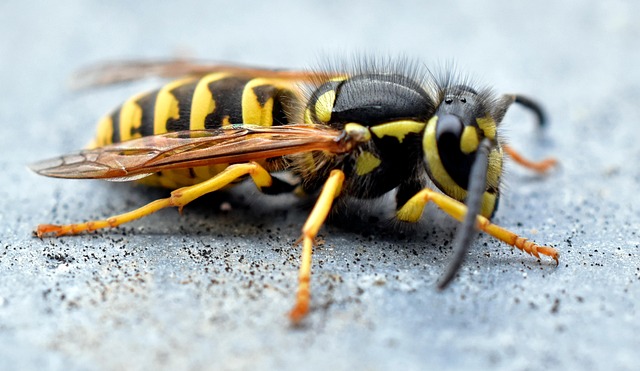Wasp behavior, driven by survival instincts and environmental cues, makes them adaptable pests. Effective commercial wasp control requires understanding their habits, including active nest building and foraging for sweet substances during warmer months. Professionals use targeted strategies like regular inspections, strategic treatments, traps, baits, proper waste management, and minimizing chemical use to reduce populations. For homeowners, early intervention through inspections and non-chemical repellents is crucial. Commercial properties pose unique challenges due to scale and structure, requiring advanced equipment and eco-friendly pesticides for effective commercial wasp control. Preventative measures like sealing entry points and regular treatments are key to long-term protection in both residential and commercial settings.
Wasp infestations can disrupt your daily life, whether it’s at home or in a bustling commercial space. This article guides you through targeted solutions for effective wasp management. From understanding wasp behavior to implementing safe and efficient residential strategies, we explore best practices for both residential and commercial settings. We delve into unique challenges faced by businesses, offering tailored solutions for commercial wasp control. Additionally, learn about preventative measures for long-term protection against these persistent pests.
Understanding Wasp Behavior: Key to Effective Control
Wasp behavior is a complex interplay of survival instincts and environmental cues, making them highly adaptable pests. Understanding their habits is crucial for effective commercial wasp control strategies. During the warmer months, wasps are most active, building nests and foraging for food to sustain their colonies. They have a particular preference for sweet substances, which often attracts them to areas near food sources in residential or commercial spaces.
Knowing this behavior allows pest control professionals to implement targeted solutions. For commercial properties, this may involve regular inspections to identify nest locations, followed by strategic treatment plans. Traps and baits can be used to disrupt their food-seeking patterns while minimizing the use of chemicals in sensitive environments. By combining these methods with proper waste management practices, it’s possible to significantly reduce wasp populations and maintain a safe, comfortable space for both residents and employees.
Residential Wasp Management: Strategies for Safe and Efficient Elimination
Residential wasp management requires a thoughtful, safe, and efficient approach to eliminate these pests effectively. For homeowners, it’s crucial to understand that wasps are highly adaptable and require tailored strategies for removal. One effective method involves identifying the specific wasp species causing the problem, as different techniques apply to each. Professional pest control services can provide this expertise, utilizing eco-friendly solutions whenever possible to ensure the safety of residents and local ecosystems. Regular inspections and prompt action are key; by addressing infestations early, homeowners can prevent wasps from establishing robust nests and reduce the risk of stings.
Additionally, non-chemical repellents and traps can be employed as a first line of defense. These strategies involve using natural predators’ scents to deter wasps or capturing them without harming either party. However, for larger or persistent infestations, more targeted interventions are necessary. Professional exterminators may employ specialized equipment, such as powerful aspirators for direct removal of nests, and residual insecticides that target wasp pathways and entry points. This multi-faceted approach ensures a safe and comprehensive solution to residential wasp problems, fostering peaceful coexistence between humans and these intricate creatures in our shared habitats.
Commercial Wasp Control: Unique Challenges and Targeted Solutions
Commercial wasp control presents unique challenges compared to residential settings due to the larger scale and diverse structures involved. Businesses often occupy multiple floors, vast warehouses, or open-air spaces that require specialized strategies for effective wasp management. One of the primary difficulties is identifying and sealing entry points, as commercial buildings tend to have more complex facades, ventilation systems, and openings that can serve as access points for wasps.
Targeted solutions for commercial wasp control include thorough inspections by trained professionals who can identify nest locations and entry points. They employ advanced equipment and eco-friendly pesticides tailored to minimize disruption while maximizing efficiency. Regular maintenance is crucial; scheduling preventive treatments during wasp season helps deter infestations. For open-air spaces, strategic trap placement and natural repellents can be effective, ensuring a safe environment for employees and customers without resorting to harsh chemicals.
Preventative Measures: Long-term Protection Against Wasps
Preventative measures are a crucial aspect of managing wasps, offering long-term protection for both residential and commercial spaces. Regular inspections are key; identifying potential nest sites early can prevent future infestations. Professional pest control services should be engaged to conduct thorough assessments, especially in areas with historical wasp activity or complex structures that may hide nests.
Simple yet effective steps include sealing entry points, such as gaps around windows, doors, and vents, to restrict access for wasps building nests nearby. Trimming trees and shrubs near buildings can also deter wasps from choosing these locations for their nests, as it reduces available nesting sites and makes areas less attractive to them.
In addressing both residential and commercial wasp problems, understanding these insects’ behavior is key to effective control. The strategies outlined for residential management offer safe and efficient solutions, while recognizing the unique challenges of commercial settings necessitates tailored interventions. Preventative measures prove invaluable for long-term protection against wasps, ensuring peace of mind in both living and working spaces. For comprehensive coverage on commercial wasp control, consider implementing these targeted strategies to mitigate risks and maintain a wasp-free environment.
